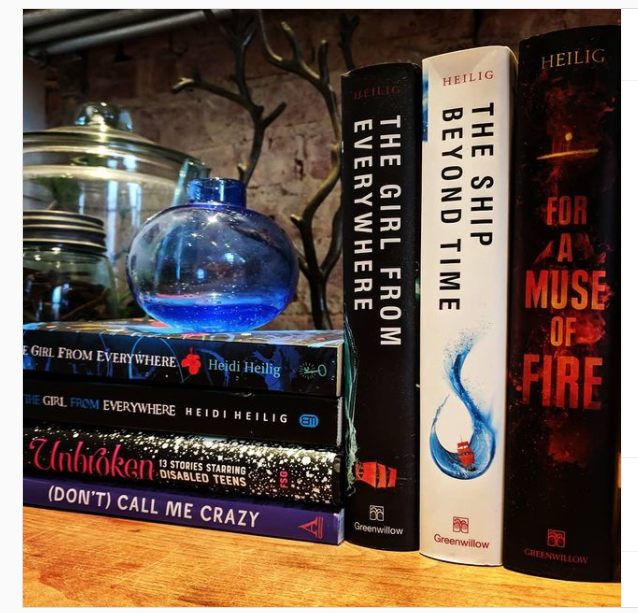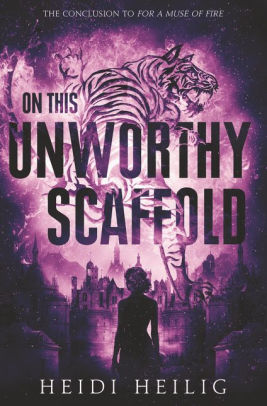What are you, crazy? a guest post by Heidi Heilig

“What are you, crazy?” I got that a lot when I was a teenager, but it took me a while to realize it was true.
I grew up in the 90s, when attitudes towards mental illness and therapy were changing rapidly. Prozac had just became A Thing, and due in part to their marketing, awareness of mental illness was growing. More people than ever began seeking treatment and medication for conditions they had only just begun to recognize. Inevitably–because we can’t have nice things–the backlash grew as well, fueling a stigma against medication and therapy.
Of course, as a teenager, I wasn’t thinking about these cultural forces. I was mostly concerned with my friendships and romances–and why I kept destroying them, sometimes in a spectacular fashion.
ADVERTISEMENT
ADVERTISEMENT
I was the outcast–the drama queen–the weirdo. I remember ruining a pool party by following a beach ball off the side of the deck and falling twenty feet through the trees to the ground. I picked myself up, grabbed the ball, and climbed back up the slope, tracking blood all over the deck. I was surprised to see it; I’d been so manic that I couldn’t believe I’d been hurt by the fall. Everyone else couldn’t believe I’d actually jumped.
This is just one instance, easily brushed aside if it hadn’t been a pattern. My behavior would be normal for a while, but then I would do something frankly bizarre without realizing until much later how out of place it was. The adults in my life blamed it on various aspects of my history or personality. “Hormones,” they said, which still irritates me. Or “she’s acting out for attention,” or “her parents are divorced.” My peers were often crueler. Then again, how could they understand what I was going through when I didn’t, either?
It was an absolute mystery to me at the time. These wild mood swings–from unstoppable sobbing to giddy celebration to schemes that made no sense in the aftermath–were obviously abnormal when measured against my classmates, or what I saw portrayed in the media. But they weren’t something I was making up, either. I wasn’t acting out–I was simply being myself. In fact, I found it impossible to act any other way.
It wasn’t until I was in my 20s and relying heavily on self-medication that I got a diagnosis of bipolar disorder. Suddenly, there was a method to my madness. My emotions had context. Even better, with a diagnosis came the potential of treatment–the hope that someday I could be normal.
Unfortunately, that’s also when stigma pounced.
You caught it there, in the word “normal,” didn’t you? When I was a teen, I wanted so badly for people to like me–or at least stop hating me–and I thought if I was “normal” it would finally happen. Of course, the older I got, the more I realized that “normal” is a made-up concept. And there were so many of those concepts floating around, many of them contradictory. “If you tried harder, you could get better without meds,” was a popular one. Or “therapy is for the weak.”
Basically, I wanted normalcy, but not through treatment, because treatment was for abnormal people.

Now, no one ever told me that directly. It would almost have been easier if they had, because then I could argue back. Instead, these ideas permeated the cultural climate I grew up in. Ideas that expressed themselves in a thousand different ways: in books and movies where the only mentally ill characters were villains or suicides. In the news, where serial killers and mass shooters were labeled “crazy.” In the curl of the lip and the question I got whenever I did something out of left-field: are you insane?
Like the relentless wind twists a growing tree, these ideas changed me. To this day, I struggle with medication and treatment, and I can’t help but wonder how different my life might have been in a different climate. People like to say that kids are resilient, and they are, if they survive; they bend instead of breaking. But those bends and crooks are a part of the adults they become. And while they can be beautiful, they can also be reminders that there were many other ways we could have grown.
Thankfully, the winds are indeed changing. Due in large part to their own social networks, kids these days have more awareness, more access to information, help, or care. Best of all, in books and other media, I see more and more mentally ill people portrayed as people–as main characters and heroes–not just villains or tragic inspirations. But the stigma still exists, and all stigma is difficult to overcome. That is one reason I write mentally ill characters, why I talk about mental illness, why I tell people–especially kids–that I myself am bipolar, as though that’s normal.
So, what am I? Crazy? Yes, I am. And I’m not alone.
Meet the author

ADVERTISEMENT
ADVERTISEMENT
Heidi Heilig is the author of The Girl From Everywhere duology and the Shadow Players Trilogy. She grew up in Hawaii, and then she moved to New York and grew up even more. She holds an MFA from NYU in Musical Theatre Writing, of all things, and lives in Brooklyn with her husband, her sons, three chickens, and a hopeful hawk.
About On This Unworthy Scaffold

Jetta is in the center of a war. With her magical power, she could save everyone, save her country . . . or she could destroy it all.
Heidi Heilig blends traditional storytelling with ephemera for a lush, page-turning commercial fantasy for fans of Tomi Adeyemi and Leigh Bardugo.
The final book in the acclaimed Shadow Players trilogy.
Jetta’s home is spiraling into civil war. Le Trépas—the deadly necromancer—has used his blood magic to wrest control of the country, and Jetta has been without treatment for her malheur for weeks. Meanwhile, Jetta’s love interest, brother, and friend are intent on infiltrating the palace to stop the Boy King and find Le Trépas to put an end to the unleashed chaos.
The sweeping conclusion to Heidi Heilig’s ambitious trilogy takes us to new continents, introduces us to new gods, flings us into the middle of palace riots and political intrigue, and asks searching questions about power and corruption.
Acclaimed author Heidi Heilig creates a rich world inspired by Southeast Asian cultures and French colonialism. Told from Jetta’s first-person point-of-view, as well as with chapters written as play scripts and ephemera such as songs, myths, and various forms of communication, On This Unworthy Scaffold is a satisfying finale to the epic fantasy trilogy. It will thrill readers who love Claire Legrand’s Furyborn, Laini Taylor’s Strange the Dreamer, and N. K. Jemisin’s The Fifth Season.
ISBN-13: 9780062652003
Publisher: HarperCollins Publishers
Publication date: 04/27/2021
Age Range: 13 – 17 Years
Filed under: Uncategorized
About Amanda MacGregor
Amanda MacGregor works in an elementary library, loves dogs, and can be found on Twitter @CiteSomething.
ADVERTISEMENT
ADVERTISEMENT
SLJ Blog Network
Name That LEGO Book Cover! (#53)
Cover Reveal and Q&A: The One and Only Googoosh with Azadeh Westergaard
Exclusive: Vol. 2 of The Weirn Books Is Coming in October | News
Fighting Public School Book Bans with the Civil Rights Act
ADVERTISEMENT







